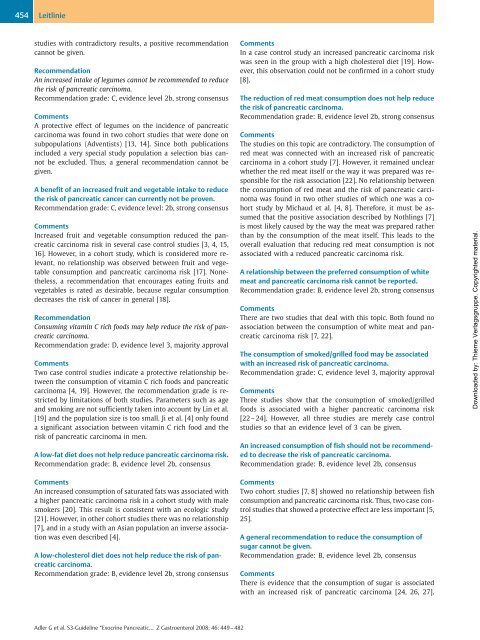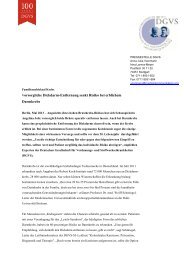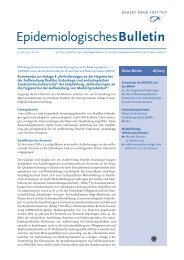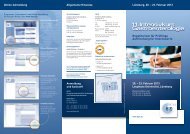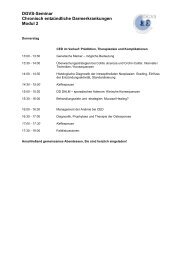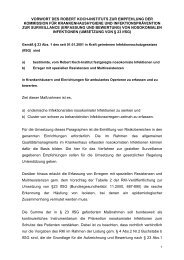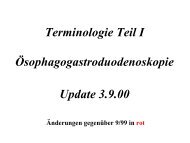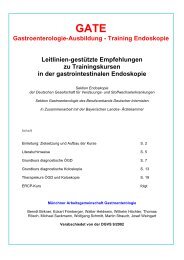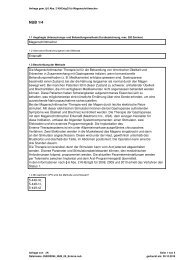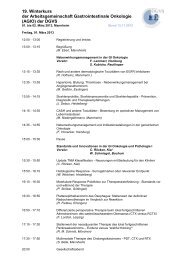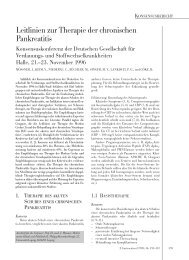S3-Guideline “Exocrine Pancreatic Carcinoma” 20071 ... - DGVS
S3-Guideline “Exocrine Pancreatic Carcinoma” 20071 ... - DGVS
S3-Guideline “Exocrine Pancreatic Carcinoma” 20071 ... - DGVS
You also want an ePaper? Increase the reach of your titles
YUMPU automatically turns print PDFs into web optimized ePapers that Google loves.
454<br />
Leitlinie<br />
studies with contradictory results, a positive recommendation<br />
cannot be given.<br />
Recommendation<br />
An increased intake of legumes cannot be recommended to reduce<br />
the risk of pancreatic carcinoma.<br />
Recommendation grade: C, evidence level 2b, strong consensus<br />
Comments<br />
A protective effect of legumes on the incidence of pancreatic<br />
carcinoma was found in two cohort studies that were done on<br />
subpopulations (Adventists) [13, 14]. Since both publications<br />
included a very special study population a selection bias cannot<br />
be excluded. Thus, a general recommendation cannot be<br />
given.<br />
A benefit of an increased fruit and vegetable intake to reduce<br />
the risk of pancreatic cancer can currently not be proven.<br />
Recommendation grade: C, evidence level: 2b, strong consensus<br />
Comments<br />
Increased fruit and vegetable consumption reduced the pancreatic<br />
carcinoma risk in several case control studies [3, 4, 15,<br />
16]. However, in a cohort study, which is considered more relevant,<br />
no relationship was observed between fruit and vegetable<br />
consumption and pancreatic carcinoma risk [17]. Nonetheless,<br />
a recommendation that encourages eating fruits and<br />
vegetables is rated as desirable, because regular consumption<br />
decreases the risk of cancer in general [18].<br />
Recommendation<br />
Consuming vitamin C rich foods may help reduce the risk of pancreatic<br />
carcinoma.<br />
Recommendation grade: D, evidence level 3, majority approval<br />
Comments<br />
Two case control studies indicate a protective relationship between<br />
the consumption of vitamin C rich foods and pancreatic<br />
carcinoma [4, 19]. However, the recommendation grade is restricted<br />
by limitations of both studies. Parameters such as age<br />
and smoking are not sufficiently taken into account by Lin et al.<br />
[19] and the population size is too small. Ji et al. [4] only found<br />
a significant association between vitamin C rich food and the<br />
risk of pancreatic carcinoma in men.<br />
A low-fat diet does not help reduce pancreatic carcinoma risk.<br />
Recommendation grade: B, evidence level 2b, consensus<br />
Comments<br />
An increased consumption of saturated fats was associated with<br />
a higher pancreatic carcinoma risk in a cohort study with male<br />
smokers [20]. This result is consistent with an ecologic study<br />
[21]. However, in other cohort studies there was no relationship<br />
[7], and in a study with an Asian population an inverse association<br />
was even described [4].<br />
A low-cholesterol diet does not help reduce the risk of pancreatic<br />
carcinoma.<br />
Recommendation grade: B, evidence level 2b, strong consensus<br />
Adler G et al. <strong>S3</strong>-<strong>Guideline</strong> <strong>“Exocrine</strong> <strong>Pancreatic</strong>… Z Gastroenterol 2008; 46: 449–482<br />
Comments<br />
In a case control study an increased pancreatic carcinoma risk<br />
was seen in the group with a high cholesterol diet [19]. However,<br />
this observation could not be confirmed in a cohort study<br />
[8].<br />
The reduction of red meat consumption does not help reduce<br />
the risk of pancreatic carcinoma.<br />
Recommendation grade: B, evidence level 2b, strong consensus<br />
Comments<br />
The studies on this topic are contradictory. The consumption of<br />
red meat was connected with an increased risk of pancreatic<br />
carcinoma in a cohort study [7]. However, it remained unclear<br />
whether the red meat itself or the way it was prepared was responsible<br />
for the risk association [22]. No relationship between<br />
the consumption of red meat and the risk of pancreatic carcinoma<br />
was found in two other studies of which one was a cohort<br />
study by Michaud et al. [4, 8]. Therefore, it must be assumed<br />
that the positive association described by Nothlings [7]<br />
is most likely caused by the way the meat was prepared rather<br />
than by the consumption of the meat itself. This leads to the<br />
overall evaluation that reducing red meat consumption is not<br />
associated with a reduced pancreatic carcinoma risk.<br />
A relationship between the preferred consumption of white<br />
meat and pancreatic carcinoma risk cannot be reported.<br />
Recommendation grade: B, evidence level 2b, strong consensus<br />
Comments<br />
There are two studies that deal with this topic. Both found no<br />
association between the consumption of white meat and pancreatic<br />
carcinoma risk [7, 22].<br />
The consumption of smoked/grilled food may be associated<br />
with an increased risk of pancreatic carcinoma.<br />
Recommendation grade: C, evidence level 3, majority approval<br />
Comments<br />
Three studies show that the consumption of smoked/grilled<br />
foods is associated with a higher pancreatic carcinoma risk<br />
[22 – 24]. However, all three studies are merely case control<br />
studies so that an evidence level of 3 can be given.<br />
An increased consumption of fish should not be recommended<br />
to decrease the risk of pancreatic carcinoma.<br />
Recommendation grade: B, evidence level 2b, consensus<br />
Comments<br />
Two cohort studies [7, 8] showed no relationship between fish<br />
consumption and pancreatic carcinoma risk. Thus, two case control<br />
studies that showed a protective effect are less important [5,<br />
25].<br />
A general recommendation to reduce the consumption of<br />
sugar cannot be given.<br />
Recommendation grade: B, evidence level 2b, consensus<br />
Comments<br />
There is evidence that the consumption of sugar is associated<br />
with an increased risk of pancreatic carcinoma [24, 26, 27].<br />
Downloaded by: Thieme Verlagsgruppe. Copyrighted material.


